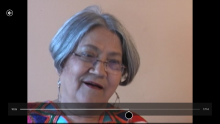
Born: Chihuahua, Mexico
Martha Cotera was born in Chihuahua, Mexico in 1938. Cotera describes her upbringing as having a strong dose of progressive politics as a result of her grandparents’ interest in Mexican politics. In 1946, Cotera and her mother immigrated to El Paso, Texas. Cotera was reluctant to move and encountered racist policies in both elementary school and high school while in Texas. Despite these challenges, she describes herself as a “total overachiever” in high school as she was a member of the Writing club, English club, and editor of the school newspaper. Cotera earned her Bachelor of Arts in English with a minor in History at the University of Texas at El Paso in 1962, the same year she became a United States citizen. Cotera cites this period as marking her awakening as a political activist.
In 1963, Cotera married fellow student, Juan Cotera, and they moved to Austin, Texas so that her husband could continue his education in Architecture at the University of Texas. Although Cotera and her husband encountered extreme racism in Austin, they were determined to stay and help transform the city. In 1964, Cotera was hired as Director of Documents at the Texas State Library in Austin. Later in 1968, she became the director of Southwest Educational Development and was put in charge of 28 libraries across the state of Texas. During this time, both Cotera and her husband were involved in several political and activist organizations including PASSO (Political Association of Spanish Speaking Organizations), and the farmworkers movement. In 1964, Cotera and other educators formed TEAMS (Texans for Educational Advancement for Mexican Americans), a group of educators who garnered support for high school students who participated in student boycotts organized by the Mexican American Youth Organization. In 1968, Cotera and her husband volunteered intermittently in Crystal City, Texas providing curriculum materials and tutoring students who were boycotting the high schools. In 1969, Cotera and her family chose to leave Austin and briefly moved to Mercedes, Texas where she and her husband helped found Jacinto Trevino College. Supported by Antioch College and its University Without Walls program, Jacinto Trevino College was developed as a college for Mexican Americans to prepare teachers for bilingual bicultural education programs. Cotera earned a Master's Degree in Education from Antioch College in 1971.
In Crystal City, Cotera headed the Crystal City Memorial Library and was responsible for democratizing the library system. Both Cotera and her husband were intimately involved in the founding and structuring of the Raza Unida Party, a third political party centered on Chicano nationalism. In 1972 Cotera ran for a seat on the State Board of Education on the Raza Unida Party ticket and was instrumental in bringing women into the party. Eventually, Cotera and other women active in the Raza Unida Party began to feel marginalized by the male leadership of the movement, so they established Mujeres de La Raza Unida, a women’s caucus within the party that advocated for the recruitment of women as members. Cotera, along with other women in the Mujeres de La Raza Unida Party, established a Chicana Caucus within the Texas Women’s Political Caucus that drafted several resolutions for the TWPC to consider. In 1974, Cotera (along with Evey Chapa) founded the Chicana Research and Learning Center in Austin, Texas which helped find grant money for research and community projects with an emphasis on women of color. Cotera eventually founded Information Systems Development, an independent research and publishing company which focused on publishing resource materials on and about Chicanos and Chicanas. Cotera self-published her first book in 1976 entitled Diosa y Hembra. Diosa y Hembra was a contribution to the recovery of lost, erased, and hidden histories of Chicana women that generated a tidal wave of interest among Chicana students and within the women’s movement. Cotera then published The Chicana Feminist in 1977, which was a series of essays and speeches reflecting on Cotera’s experiences and observations of the dynamics of feminism within the Chicano/a Movement and of racism and classism within the women’s movement. Since publishing these pivotal works, Cotera has published several more works about Chicanas in politics and the history of Chicanos.
Cotera worked for nearly three decades as a community liaison for the Benson Latin American Collection at the University of Texas until the position was eliminated due to budget cuts and shifting priorities. She is currently an independent translator and community consultant, and remains active in local politics and community initiatives including the Mexican American Cultural Center, immigrant rights, and Code Pink. She has also been a strong and eloquent advocate against the death penalty in Texas.
